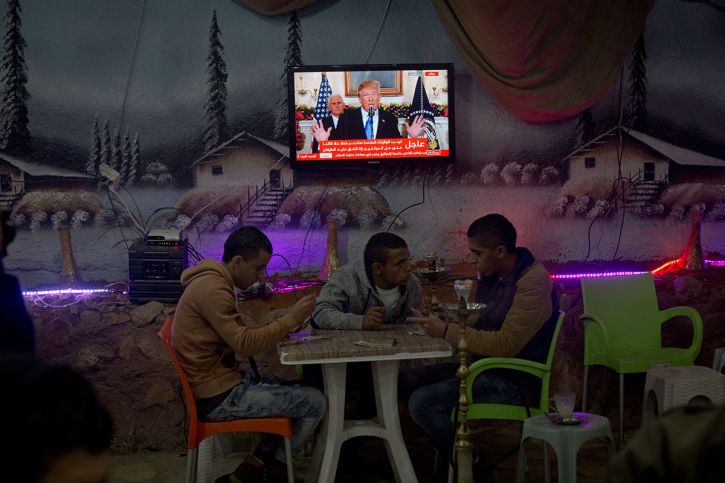Trump Recognizes Jerusalem as Israel’s Capital
President Trump has announced that the U.S. recognizes Jerusalem as Israel’s capital and will move the U.S. embassy there. Now the world holds its breath.
Palestinians play cards during President Trump's televised speech in the West Bank City of Nablus, Dec. 6, 2017. 
President Trump is actually responding to an act passed by Congress in 1995, which recognized Jerusalem as Israel’s capital and required the president to move the embassy. Since then, every U.S. president has temporarily deferred fulfilling that requirement because of the perceived risk it would pose to peace efforts between the Israelis and Palestinians. The Palestinian ambassador to the U.K. has said that this decision would be “a kiss of death to the two-state solution.”
The danger of this decision
President Trump had been warned by multiple world leaders of the danger this move poses. It has been condemned by almost every world leader who has commented on it. Palestinian President Mahmoud Abbas warned of “dangerous consequences.” The Palestinian position is that East Jerusalem would be the capital of any Palestinian state.
Scholar Aaron David Miller summarized the concerns about President Trump’s decision this way: “The problem is that Israel has declared the entire city to be its eternal and undivided capital, including the eastern part of the city where many Palestinians reside and where the Palestinian Authority hopes to establish a capital once a Palestinian state is created. If Trump asserts that US policy is that Jerusalem is the capital of Israel, it would be tantamount to saying that Washington now recognizes Israel’s sovereignty over the entire city. If he simply says that just West Jerusalem is Israel’s capital, he risks alienating the Israeli government by suggesting that the eastern part of the city isn’t included.”
The fear is that this will not only make an unlikely peace agreement even more unlikely, but that this could ignite a new wave of violence.
The fear is that this will not only make an unlikely peace agreement even more unlikely, but that this could ignite a new wave of violence. The Palestinian Authority says it will not lead those under its authority to violence against Israel because of the decision, but Hamas (which controls the Gaza Strip) has said the decision will “open the gates of hell.”
Jerusalem is the world’s most dangerous powder keg, and today’s announcement may provoke a new wave of violence—possibly a Third Intifada—against Israelis. It also could lead to attacks against U.S. targets throughout the world. Before the announcement, the U.S. State Department put U.S. embassies on alert for possible protests and violence after President Trump’s announcement. Representatives of Turkey, Egypt and Saudi Arabia have warned of “a red line for Muslims,” “possible dangerous repercussions” and that the decision is “provocative to all Muslims’ feelings.” The world now holds its breath to see what will happen next.
Jerusalem remains and will continue to be a “very heavy stone for all peoples” (Zechariah 12:3). The Bible has much to say about the future of Jerusalem and the Middle East. For insight into this volatile issue and what the Bible says about the future of Jerusalem and the Middle East, read the following material:
- Jerusalem: A Paradox of Biblical Proportions
- Jerusalem in Prophecy
- The History and Future of Jerusalem
Date Posted: December 6, 2017

 by Erik Jones
by Erik Jones

